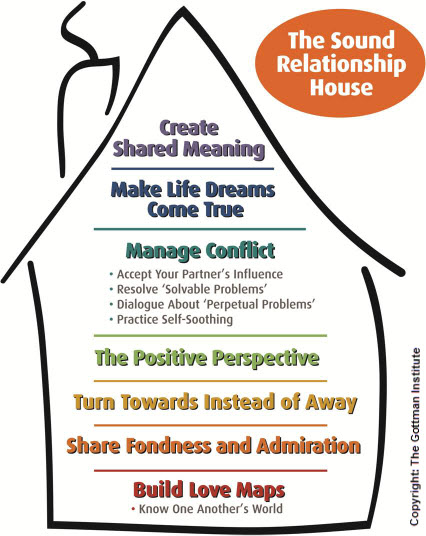Improving Your Communication Using a Positivity Approach
Dr. John Gottman studied communication and interaction patterns of couples in the “love lab” he established at the University of Washington in Seattle. Here couples came to a bed and breakfast type setting where their interactions and communications were recorded and carefully analyzed.
A Classic Communication Study about Couples
From an initial group of 130 newlyweds, 17 couples were divorced at the six-year point in their marriages. Gottman divided them into what he called “masters and disasters.” What set them apart? The most significant finding was that it was not arguments about key issues, such as money or sex but rather the presence or lack of emotional connection in their communication. When small bids for connection continually go unnoticed the friendship between the couple begins to erode. It is this disconnection that leads to arguments that are really about nothing. Arguments become more frequent until the time comes when even positive gestures take on a negative slant (negative sentiment override) and communication has broken down.
The Sound Relationship House
 Aspects of a successful relationship are shown in pictorial form as a house consisting of seven floors. The side walls are trust and commitment.
Aspects of a successful relationship are shown in pictorial form as a house consisting of seven floors. The side walls are trust and commitment.
In “The Sound Relationship House,” bids for connection are termed “turning towards or turning away.” In the study of 130 couples the ones who were still married turned towards each other 86% of the time when there was a bid for connection versus 33% for the couples who divorced.
The first 3 levels of the house all relate to friendship. The happy couples were calm with one another even when disagreeing. Their stress hormones were less elevated and their heart rates lower. The ability to laugh at themselves and have a similar sense of humor were advantages too.
“Love maps,” the first level of the house, is about how well the couple knows each other. When couples meet they usually share details of their lives, families etc. and it is exciting. After a time, especially when busy with children, work obligations, etc., it is easy to disconnect. The couple no longer has an intimate knowledge of each other’s hopes and dreams or day to day experiences. An example of this is when a woman hears her husband talking to a friend on the phone and she finds out some thoughts or feelings that he has not shared with her. A friend of mine married to a doctor would say he must have used up all his words with his patients and had none left for her!
Next, the third floor is “fondness and admiration.” When a couple has lost a positive view of their partner they are more likely to talk about the bad times in the past rather than the good times. In successful relationships, this can be described in general terms as having the person’s back or giving them the benefit of the doubt. It is about recognizing the positive rather than finding fault or always needing to be right.
Corrosive Communication Styles
John Gottman describes a group of corrosive communication styles as ”the four horsemen of the apocalypse.” These are criticism, defensiveness, contempt and stonewalling.
The critic generally blames their partner whilst accepting little responsibility. As criticism increases it comes to a point where even positive gestures might be viewed in a negative light. The partner will most likely respond defensively.
When criticism reaches the point where one partner only sees faults and will be using terms such as “always” or “never” to describe their partner’s flaws contempt is reached. The person’s character and worth are maligned.
“Stonewalling“ is more typical of men than women. It is a disengagement either by refusing to engage. Perhaps the only communication is eye rolling, shoulder shrugging or walking away.
How to Avoid Corrosive Communication
You can avoid this pattern by using a soft rather than a harsh, accusatory startup. Listening and paying full attention and asking questions rather than playing the blame game. Most importantly, get over the fight to be right. Take a pause – no need to jump straight in.
In couples therapy, I use a very useful online tool, the Relationship Checkup. derived from Gottman’s work. Both strengths and weaknesses can then be discussed in the couple’s counseling sessions.
Relationships like Marriage or Life-Partnerships Don’t Have to Feel Like a Battle
If you want to make some changes and begin to work on your relationship, I invite you to call me today to set up an appointment held on Zoom by either phoning me at (941) 306 1235 or emailing me at marilynhalls@icloud.com.
I offer a complimentary 15 minute by phone if you have questions you would like answered before beginning marriage or couples counseling.
